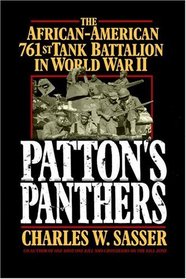Helpful Score: 1
While this is a good book on the experiences of the 761st, it can be somewhat disjointed in its coverage as, especially toward the end of the war, it seems to bounce around relating the experiences of the men who fought and serviced the tanks.
It often explores the prejudice the men received, while at the same time showing their "what the heck" attitude toward that prejudice.
The real crime was the report of their second battalion commander who pretended he supported the men and then submitted a degrading report on their fighting and leadership abilities that he apparently believed was what the army wanted. I hope this jerk received his just deserts later in life.
As a result, the army never sent another black armored battalion to combat, and the ones who paid for that were the white infantrymen who deserved better support.
For the men of the 761st were a well-trained and efficient fighting force that contributed more than their share to the victory in Europe. A fact that was confirmed when the battalion finally received the Presidential Unit Citation in early 1978 from President James Carter.
[For some reason, perhaps a typo, the text in the book listed the award as being given in 1998.]
It often explores the prejudice the men received, while at the same time showing their "what the heck" attitude toward that prejudice.
The real crime was the report of their second battalion commander who pretended he supported the men and then submitted a degrading report on their fighting and leadership abilities that he apparently believed was what the army wanted. I hope this jerk received his just deserts later in life.
As a result, the army never sent another black armored battalion to combat, and the ones who paid for that were the white infantrymen who deserved better support.
For the men of the 761st were a well-trained and efficient fighting force that contributed more than their share to the victory in Europe. A fact that was confirmed when the battalion finally received the Presidential Unit Citation in early 1978 from President James Carter.
[For some reason, perhaps a typo, the text in the book listed the award as being given in 1998.]




![header=[] body=[Get a free book credit right now by joining the club and listing 5 books you have and are willing to share with other members!] Help icon](/images/question.gif?v=52444873)
